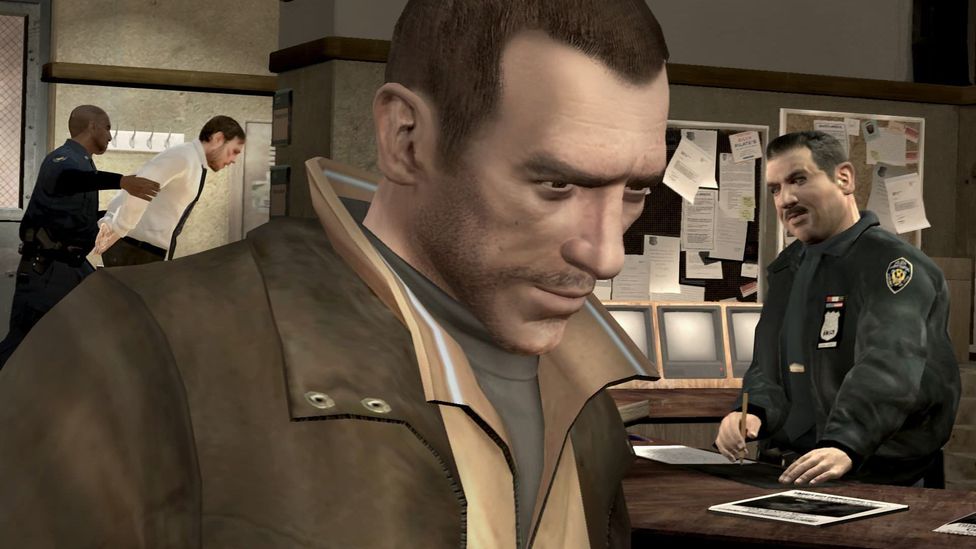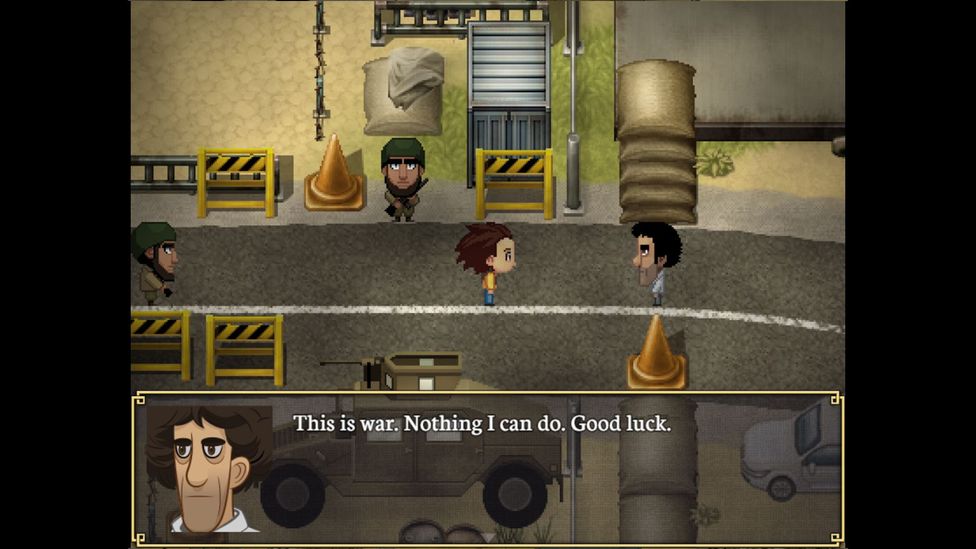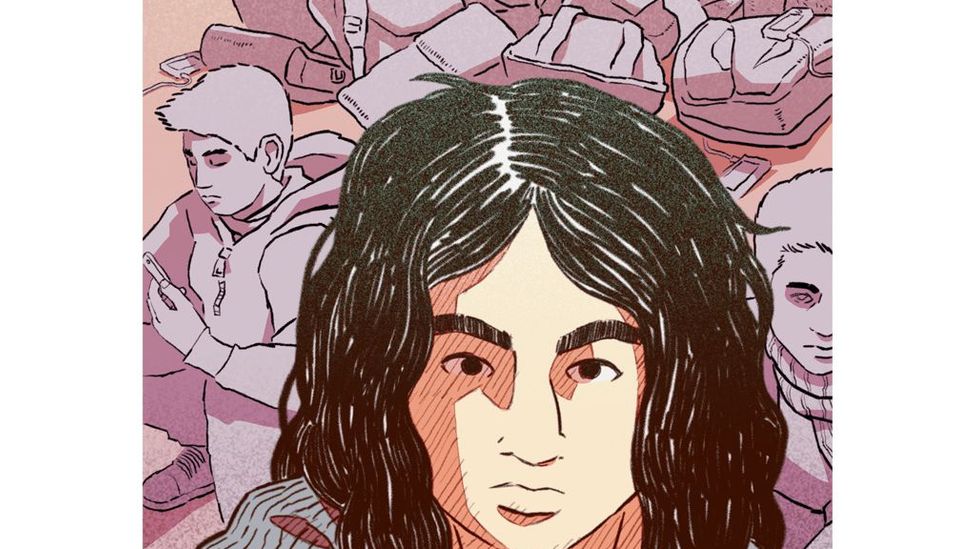A daringly political blockbuster game

“The fast food, the cheap gas, the fake [breasts] – there’s a shortcut for everything here!” beams Roman Bellic, the big-hearted immigrant owner of a failing taxi firm. “You just need to know where it is.” His first cousin Niko Bellic – a man who has newly emigrated from the Balkans, and is completely unconvinced by America’s abilities to fix their broken lives – bluntly interjects: “Yeah, but most people don’t know where it is, so they stay at the bottom of the food chain! They stay there until they’re burnt out or dead.”
More like this:
– The WW1 game that’s eerily accurate
– The Cold War battle over Tetris
– Why Streetfighter II was a phenomenon
Although this profound exchange occurs in a throwaway side mission about a quarter of the way through Grand Theft Auto IV, it’s a perfect reflection of how the 2008 game, now celebrating its 15th anniversary, dared to take the blockbuster gaming franchise (which has sold more than 400 million copies globally) somewhere darker and more political.

GTA IV’s protagonist Niko Bellic is a survivor of the Balkan wars already disillusioned by life in the US (Credit: Rockstar Games)
Started in 1997, the Grand Theft Auto series almost immediately created a name for itself as a nihilistically provocative and crudely satirical pop-culture sensation, in which players took on the roles of urban criminals testing the frameworks of US society as they tried to rise up the ranks of a gangland underworld. Created by Rockstar, a games development studio based in Dundee, Scotland, the GTA games have always been a parody of US excess, with witty in-game jokes on everything from heart attack-inducing burgers to smart homes.
A more serious turn
However, whereas previous GTA games leaned towards toilet humour over sincere messages about the human condition, and lead protagonists tended to be silent assassins addicted to mischief (GTA 3’s Claude Speed) or recycled male Hollywood rags-to-riches archetypes (think GTA: Vice City’s Scarface-esque Tommy Vercetti), the Niko Bellic character was a bold left turn from developer Rockstar, directly forcing millions to see through the eyes of a jaded immigrant. There is a nagging sense throughout the game that Niko is having an existential crisis while committing his miscreant acts (including stealing cars); something shaped by voice actor Michael Hollick’s crestfallen delivery. When Niko drives past sex workers, he utters the line: “You poor wretches!”
He dresses in cheap tracksuits; tells a love interest of his PTSD nightmares; and tends to prioritise emotive philosophy (“War is where the young and stupid are tricked by the old and the bitter into killing each other”) over giddy quips while driving to missions with his co-conspirators. Having fled the Balkan wars, Niko hopes to be re-energised by the bright lights of Liberty City (a fictional re-working of New York City). Yet he quickly discovers that corruption, greed and “flying rats” are just as prevalent in the so-called land of the free, and that cousin Roman is even being extorted by gangsters.
“When I worked in Sarajevo [the capital of Bosnia and Herzegovina] you could still see the artillery damage, so for all the countries involved in the Yugoslav wars it is something that continued to visibly haunt them,” Georg Hobmeier, the co-founder of Vienna-based games company Causa Creations, explains to BBC Culture. “When Niko Bellic was unveiled, it felt so close to home. People in Eastern and Central Europe were very surprised! It felt like video games were stepping outside their comfort zone, and daring to show much more complex, tortured people.”
Causa is the development studio that brought to life 2017’s Path Out – an indie game that replicated the dangerous real-life escape route of war-torn Syrian refugee Abdullah Karam and has been used by the United Nations in schools to help students empathise with refugees and immigrants. According to Hobbmier, GTA IV, which was released on 29 April 2008, helped shift the narrative goal posts, encouraging a generation of developers – including himself – to root stories in the vulnerable perspectives of immigrant workers.
“There’s a satirical rock song in Bosnia called USA by Dubioza Kolektiv, which has the lyrics: ‘I am from Bosnia Take me to America / I really want to see the Statue of Liberty’,” he tells BBC Culture. “This song reminds me of GTA IV, because the game similarly [contrasts] the dream promised to immigrants [with] the grim reality that often awaits them when they arrive. Look, GTA IV moved the goalposts. It transformed the field. The introduction of these themes in a project of that size is more important than a small indie game doing it; it’s more revolutionary.”

GTA IV helped pave the way for other games focusing on refugees and immigrants, such as 2017’s Path Out (Credit: Causa Creations)
For fellow developer Florent Maurin, it was just as seminal. Maurin is the founder of games developer The Pixel Hunt, a Paris-based studio responsible for Bury Me, My Love, a game that cleverly immerses players in the heart of a desperate Whatsapp conversation between a Syrian refugee on the move to Germany and her husband back in their home country. He points out just how abrupt a shift GTA IV was in tone from its predecessor, 2004’s GTA: San Andreas. “In GTA IV, everything seems more weighted and grounded, from the colour palette to the way the cars actually drive, to the character’s animations,” he opines.
“This makes for a surprisingly heavy and dark experience, to the point that when you encounter the unavoidable silly missions every GTA has to offer, they feel out of place. Niko looks terribly depressed, and you really had to be GTA to ‘sell’ a hero like that.”
It’s a sentiment echoed by John Wills, a professor of American Studies at the University of Kent, who senses GTA IV was a deliberate effort from Rockstar to subvert the cartoonish vibrancy that had previously defined the series and make a story apt for a world that in 2008 was freefalling into a bleak global recession. “The grey tone of the city is such a contrast to the solar flare of Los Santos/Los Angeles [the setting for GTA: San Andreas], with a real focus on debt, the hard life, and realism,” he says. “In GTA games there are enduring themes of the attraction of criminality, the pressure of personal failure, a sense of broader masculine crisis, and an America that consistently disappoints. But the futility of American uplift is more conspicuous and serious in GTA IV.”
A comment on the time
Both Maurin and Wills believe this tonal shift was driven by the real world GTA IV was mirroring. In 2005, when the game’s development started to take shape, the US migrant population (consisting of legal and illegal immigrants) reached a new record of 35 million, according to Census Bureau data. And in response to the growth in unauthorised migration and the backlash around it, the US government initiated a heightened militarisation of its borders, with the recently-formed Bureau of Immigration and Customs Enforcement (now know as US Immigration and Customs Enforcement) becoming increasingly powerful. In fact, according to the National Council of State Legislatures, 570 pieces of legislation dealing with legal and illegal immigrants were introduced in the US in 2006 and at least 1,562 in 2007.
When Niko is chased by helicopters in GTA IV after committing one too many crimes, the choppers are branded with a “‘Patriotism and Immigration Authority” logo, with their pilots shouting phrases including: “Let’s tighten the noose!” The clear suggestion is that Bellic is being hunted by a blood-thirsty border control, rather than the cops.
“Americans were starting to take helicopters to hunt Mexican illegals, and they were aggressively putting barbed wire at their borders [when GTA IV was being made],” Hobmeier says. “The European borders were militarised too. In the UK, in the mid-2000s, you had people sneaking in through lorries and [shipping] containers. The world of GTA IV mirrors all of this. In the game Niko is literally being hunted by the government.”
Rockstar is famously secretive, and declined to take part in this feature, but in comments from a 2008 interview with its co-founder Dan Houser, he confirmed the idea for GTA IV was to make Niko feel like an illegal alien. “We wanted someone who felt tough but also like an alien,” he commented. “The idea of this immigrant story began to seem fun and interesting and he was a good character. On the one hand he’s innocent, on the other he’s battle-hardened and world-weary. Right now, a modern ‘arriving in America’ story feels very interesting to us.”
Yet it would be disingenuous to say Rockstar got absolutely everything right about Niko Bellic’s portrayal. The character frequently mispronounces Serbo-Croatian phrases, a by-product of the fact that voice actor Michael Hollick was an American putting on an exaggerated accent, and the game forces him into tiresome “assimilation” quests in which he has to take his friends out bowling and drinking to settle him into the US. Above all, critics have argued that Niko is merely a generalisation of Eastern European immigrants, which perpetuates harmful stereotypes about this demographic being more susceptible to criminal activity. For Dr Jess Rowan Marcotte, a consultant for Refugee Engagement with Video Games for the United Nations, it was good to see GTA IV centre its narrative around an immigrant story, but it still didn’t go far enough.

Bury Me, My Love is another game centring the migrant experience, immersing players in a conversation between a Syrian woman and her husband (Credit: The Pixel Hunt/Figs/Arte)
“It is a credit to the writers and creative direction that they chose to try to take into account the fallacies of the American Dream,” she says. “That being said, the ramifications of that decision didn’t perfectly carry through the rest of the game. Largely, the gameplay and mechanics follow a typical violent GTA game, despite the narrative window dressing.”
So, what exactly is GTA IV’s legacy? In many ways it remains the “outsider” of the franchise. Its follow up GTA V became the biggest-selling game of all time by reverting back to a more conventional action-adventure story, and switching between three lead characters (Franklin, Michael, and Trevor) who killed gleefully and lacked Niko Bellic’s degree of moral conscience. It dwarfed GTA IV’s sales in the process. This means a darker, riskier storyline like that of Bellic’s is unlikely to be repeated, with Rockstar in no rush to release a remastered version of GTA IV, especially after the critical backlash for its “messy” GTA: Vice City, and GTA: San Andreas remasters.
Leaks from the upcoming GTA 6 suggest it will feature a new female protagonist, which will at least once again constitute fresh ground for the series. However, Hobmeier would be surprised if the new GTA game takes equivalent narrative risks to the fourth entry, with the 2023 business landscape also more risk-averse than it was back in 2008. “When we were trying to get publishers interested in Path Out’s follow- up, there was some who backed out because the countries they operate in have such an anti-immigrant feeling,” he says. “We’re in the middle of a culture war right now, and the people with the money will play it safe to protect their investment and avoid cannibalising an audience by telling risky stories. Because of that, it’s unlikely GTA IV could be repeated today.”
But wherever the GTA franchise goes next in terms of its societal themes, Wills says GTA IV will only grow in stature. “A growing cultural divide [over immigration in the West], makes it perhaps more important than ever for games like GTA IV to humanise the immigrant experience, and show how we need to have compassion, not hatred, for all people,” he says. “The idea of exploring the outsider is an important one for players to engage with on so many levels. Although the gameplay format of GTA IV, awash with often gratuitous violence, is hardly the best vehicle for this, it at least succeeds in creating compassion.”
For the final mission of GTA IV, Niko Bellic is faced with an impossible choice, which will certainly result in the death of a loved one. The very first thing the character sarcastically says after this mission ends, and he wakes up in his apartment, is: “So, this is the American Dream? This is the victory we longed for?” The GTA series has satirised the US many times before, particularly its need to super-size everything and an over-reliance on guns, but The Pixel Hunt’s Maurin argues GTA IV was the first entry to truly examine the limitations of The American Dream for those who aren’t American.
“Using a character that ran away from war-torn Yugoslavia is still pretty bold in 2023,” he concludes. “GTA IV had something deeper to say, something truly nihilistic, and it said it with its story, its ending, its characters, but also with its aesthetics and its overall sadness. It’s a game about the impossibility of redemption for some [in America], especially those like Niko Bellic.”
If you would like to comment on this story or anything else you have seen on BBC Culture, head over to our Facebook page or message us on Twitter.
And if you liked this story, sign up for the weekly bbc.com features newsletter, called The Essential List. A handpicked selection of stories from BBC Future, Culture, Worklife and Travel, delivered to your inbox every Friday.








